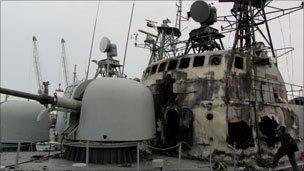Libya: Not at the tipping point yet
- Published

When the Libyan government announced plans earlier this week to deploy human shields to protect telecommunications sites from Nato bombing, it quickly prompted comparisons with Saddam Hussein's past tactics in Iraq.
It smacked too of desperation, as the Western-led military campaign enters its third month, and the uprising its fourth.
It has certainly not been a good past week for Col Gaddafi.
He, his son and brother-in-law are now wanted on war crimes charges.
After pushing his forces back from Misrata, Nato has put a good part of his small navy out of action.
Col Gaddafi and his supporters must be wondering which of their offices or bunkers will be hit next, after a series of strikes on government buildings in the capital.
Rumours of defections further jangle their nerves.
Yet, for the moment, Col Gaddafi looks as though he can last it out.
Learning to make bread
Travelling around Tripoli, even with the restrictions foreign journalists face, what is striking is how relatively normal the city feels - at least for the capital of a country supposedly at war.
There is still plenty of food in the shops. Prices for some goods have gone up, but overall they have remained surprisingly stable so far.
There is a bread shortage - but not because of a lack of flour, but of bakers. Most were Egyptians who fled during the early weeks of the uprising.
More Libyans are learning how to make bread themselves.
There are signs of stress too. Gun-toting security agents in a mixture of uniforms have set up checkpoints across the city, looking for rebel sympathisers.
Many shops are closed, for lack of custom.
Wander round the main souk and you see alleyways of green shutters pulled down, with just a handful of shopkeepers sitting outside with time on their hands.
Work has stopped on grand construction projects, cranes suspended above empty shells.
The roads are much quieter, because many people are not using their cars to save petrol or they have adopted other means of transport like diesel-powered mopeds or even push-bikes.
Lines of vehicles waiting for petrol deliveries stretch for blocks.
But some supplies are getting through, despite the international embargo.
It is a sign the government still has plenty of funds that it is been able to keep the price of petrol unchanged since the fighting began - just 15 cents (9p) a litre - despite the shortages.
Voices of dissent
That is a sensible self-protection of course, given the likely reaction if the price started going up.
On the streets, it is difficult to talk to people, but not impossible - and you do hear voices of dissent.
For people living near the targets of Nato jets, it has been a terrifying experience.
There is an apartment block right next to a government office hit earlier this week - which Nato says was linked to Libya's intelligence services and the Libyan government says was an anti-corruption agency.
The strike again conjured up comparisons with Iraq - the building itself still standing, but its insides ripped out by explosives dropped in accurately through the roof.
Some of the windows of the next-door block of flats were blown out. Traumatised residents came on to the street outside - yet incredibly, it appeared that no-one had been injured.
So, for now, Tripoli's residents have got used to these attacks and are carrying on life as best they can.
"There is no problem with the bombs," says one taxi driver confidently. "Libyan people are strong."
But it is not clear how much effect even these stepped-up strikes on Tripoli are having on Col Gaddafi and his government.
Nato says the ships it bombed on Thursday night had been used to lay mines, which could be a threat to civilians and its own vessels.
But the Libyan authorities presented evidence which they said showed the five navy ships destroyed in Tripoli had not left the port since late March.
Even if they were laying mines, these ships were clearly not a priority for Nato.
Space for talks
After more than a week off-screen, Col Gaddafi has appeared again on television, in what officials say is footage taken on Thursday.
Things could change suddenly, of course. His funds will not last forever.
There is renewed fighting with rebels in Libya's western mountains.
But it was noticeable how little Barack Obama mentioned Libya in his speech, keen perhaps not to draw attention to a situation widely regarded as a stalemate.
While he talked of a time when Col Gaddafi "inevitably leaves or is forced from power," the US president did not reiterate his past calls for the Libyan leader to go immediately.
Earlier this week, the influential think tank the International Crisis Group said the only solution was a negotiated settlement.
So it is possible that, with no sign of a breakthrough here, Mr Obama is leaving some space for talks.